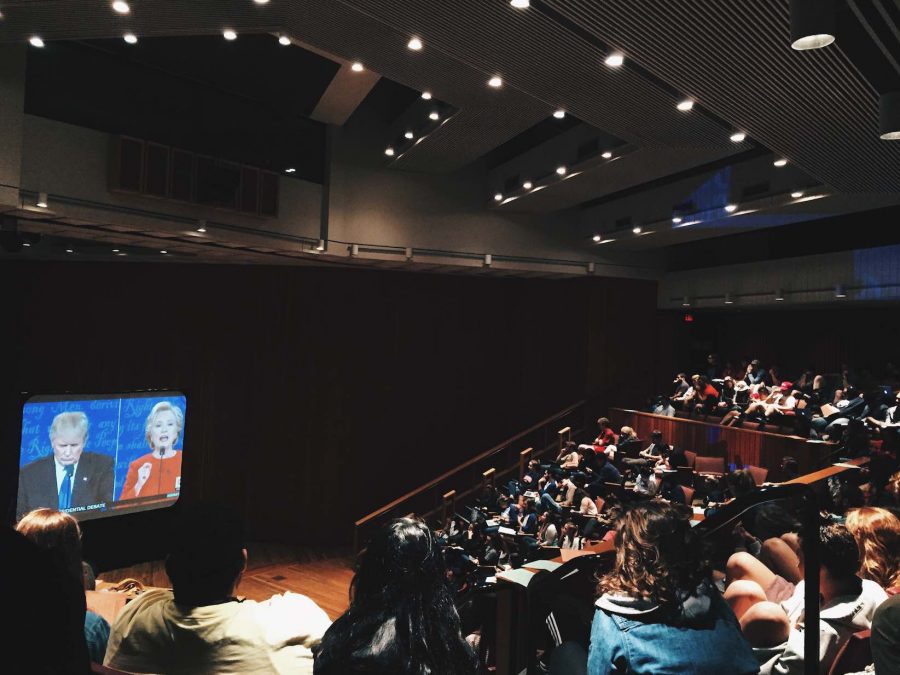Hundreds Gather for Debate Watch Party
Photo Courtesy of Zoe Kiefreider ’20
Approximately 200 students fill up seats in ATS to witness the monumental first debate between Hillary Clinton and Donald Trump at September 26 viewing party.
The department of political science, the political science majors committee and Student Senate co-hosted the first presidential debate viewing party at 8:30 p.m. in ATS on Monday, Sept. 26. The event was highly anticipated, with many of the 200 students who showed up arriving early to secure seats.
The Carlisle Theater also held a Watch Party, according to Theater Manager Leslie Sterner. The screening was hosted by Harrisburg radio station WHP 580, and gathered a crowd of about 600 people. The radio station will host another Watch Party at the Carlisle Theater for the upcoming Oct. 19 debate.
The debate, which began at 9 p.m. and ran for 90 minutes, was sponsored by the bipartisan Commission on Presidential Debates, and was moderated by NBC News’ Lester Holt at Hofstra University in New York.
Holt’s line of questioning emphasized three main topics: “America’s Direction, Achieving Prosperity, [and] Securing America,” according to an announcement released by the commission on Sept. 19.
The candidates touched on high-profile topics like Clinton’s emails and Trump’s tax returns, in addition to areas such as trade policy and cyber security. Toward the end of the debate, the candidates commented on police violence towards young African-American men. Trump and Clinton appeared to reach common ground on their opinions towards gun control. Specifically, both expressed support for tighter restrictions towards those on government watch lists.
David O’Connell, assistant professor of political science, prefaced the event with a brief introduction.
“People typically overestimate the influence of a political debate, but this may be an unusual year,” said O’Connell. He stated that poll movement is minimal this late in the election cycle, and most people have decided who their candidate will be with some finality. He further maintained that, considering how unpopular the two candidates are and the fact that around 20% of voters are undecided or leaning towards a third party candidate, the debate may yield the few points that make or break either candidate.
Sarah Niebler, assistant professor of political science, followed O’Connell and reminded students that polls released immediately following the debate would be rushed and unreliable. She also noted that a candidate’s first performance on the main debate stage did not predict definite failure or success, as correction and adjustment are part of a politician’s job.
Prior to the debate, some students were most looking forward to witnessing Donald Trump’s presentation of himself.
“I want to see Trump demonstrate to Americans what his supporters and I saw on the campaign trail,” said Krysti Oschal ’17, chair of the College Republicans club. “I want him to articulate his vision for America to the American people.”
Attendees also wondered how Hillary Clinton would be able to respond to Trump’s unconventional style. Elaine Hang ’19 anticipated possible difficulty for Clinton in garnering support given how she does not fit the mold of “traditionally masculine qualities [that] so clearly dominate our political system.”
The event was followed by an informal discussion led by the Department of Political Science, however most students left after the broadcast of the debate. The sole attendee that remained was Philip Morabito ’17, chair of the College Democrats. He maintained that Clinton “demonstrated command of her plans, as compared to Trump, who was all over the place.”
Still, Trump supporters like Mitchell Snyder ’19 were pleased with the candidate’s performance. Snyder says Trump appeared to keep a more level head and had fewer “tirades,” signaling progress towards a more presidential demeanor.






